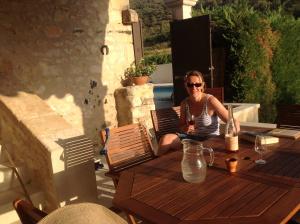 I haven’t posted anything about my writing since the new year, but many of you know my current project is to write the first draft of my second novel in six months, finishing by the end of 2014. It’s a self-imposed deadline, because I have something to prove. I’m very grateful to have the support of so many people spurring me on and asking how it’s going.
I haven’t posted anything about my writing since the new year, but many of you know my current project is to write the first draft of my second novel in six months, finishing by the end of 2014. It’s a self-imposed deadline, because I have something to prove. I’m very grateful to have the support of so many people spurring me on and asking how it’s going.
But I need to rewind before I can unwind. In just over two weeks, I’ll be back on this gorgeous terrace in Provence where two years ago I wrote the short story on which my new book is based, staying up ’til midnight several nights in a row. It was a game-changer. Everyone thinks I’m joking but that piece was a personal protest against the depiction of female sexuality in Fifty Shades of Grey (I’d recently read the first volume). It came pouring out with a conviction that I hadn’t experienced writing my first novel, then out on submission to agents. I experimented with a different style. It turns out that is my style.
It was the best thing I’d written by far and if that sounds cocky, the sting was that I realised my novel was very mediocre. I was feeling disheartened at my lack of progress and when the new story was shortlisted in the Asham Award and the judges described it as ‘novelistic’ in their very generous comments, they gave me the hope I needed. Someone who didn’t know me thought I could write. I paid for a professional edit, rewrote the novel with confidence and passion and the other missing ingredients, got lots of interest, got a brilliant agent and the rest isn’t history – it’s my present, and I continue to hope, my future.
The story, set in Paris, had a complete arc already. I spent months dreaming up new strands, subplots, etc to expand it into a full-length novel before agreeing with my agent that zooming in was the way to go rather than panning out. It makes a huge difference having the benefit of Diana’s advice and experience this time around – it’s not half as lonely as before.
I had a feeling this was going to be intense, but that was the whole idea.
Since I began writing it three months ago, I’ve worked on the manuscript six days out of seven, and last week when both our sons were away, I really went for it, blocking out all distractions until my husband got home from work. In theory I’m knocking out the first draft to have something to work with – a common approach that makes a great deal of sense (and not how I wrote the first one).
In practice, I soon found that sticking to the first draft ‘rule’ of not editing as you go and leaving wrong turns to sort out later doesn’t suit me at all. Nobody can tell you how to write your book. I admire anyone who can cope with it, but I’d find it intimidating having to confront a giant shapeless monster at the next stage. I’m not a fast writer and whilst I can edit (full manuscripts) for eight hours a day, I found doing 2 three-hour stints a day rather than one completely exhausting – locating the words and ideas in my head is one thing, translating them into sentences someone might actually enjoy reading is another, and it’s not something I want to rush. That’s the part I absolutely love.
There have been a few surprises. I never thought I’d get hung up on wordcount and I’m still sceptical about it as a benchmark of progress (I wrote at least 200,000 words to get my final count of 88,000 for book one) but you have to measure it somehow. I’m on course to meet the magic target of 40,000 words before I return to ‘my’ pool amongst the vines in mid-August. It’s often said that if you get this far, you’ll finish the novel, but I knew that already. It helps that I know how it ends!
The drawback of my editing habit is that the day invariably starts with me chopping a load of the previous session’s output. On the face of it that’s depressing, but overall I have a better sense of knowing what I’m doing this time and the confidence to do it my own way. Reading back over previous chapters helps me focus on where I’m going. I have my outline, but it’s only the equivalent of the numbers in a ‘join the dots’ that also needs colouring in. This is a story that’s very dependent on character dynamics and motivation which only fully reveal themselves to me in the making. It’s obviously very ropey – it’ll take as long as it takes to get right and it won’t be easy.
The second big surprise is that I’m writing it in the first person. All my short fiction has instinctively been first person but I always thought it would be impossible to sustain over 80,000 words. After only five chapters in third person the rawness and immediacy of the protagonist was missing. It felt distant and unengaging. I had to let her tell this story in her own voice – the words may come from me but they belong to her.
One of the issues new writers face is the pressure to deliver the dreaded sales hook. I’m deliberately not revealing the premise of this story online, but I’ve discussed it with a few people and the universal reaction is ‘OOH!’ which is very exciting. Another is the likeable characters/wanting to fall in love with the characters thing (I wrote about this here). This frustrates me as I don’t personally need or want this from every book I read.
The best way to describe my relationship with my protagonists is that I feel for them. I do also like them – I wouldn’t choose to spend so long with characters I disliked – but they are complicated and flawed, a mixture of postive and negative, because that’s my perception of real people and of myself. I can’t second guess how anyone else might respond – one of the most rewarding aspects of sharing my first book has been the astonishing diversity of reactions (and a special thank you to those who’ve read it recently – your encouragement was a real morale boost!)

That’s the kind of book I want to write.
*It’s not me.
I’d love to hear how your writing’s going. Do you have a specific goal at the moment?
*POSTSCRIPT*
Next week in the final post before I disappear, my personal Poolside TBR List. I’ve already read everything on my Summer Reads - find out what I’ll be reading on my sunlounger.

